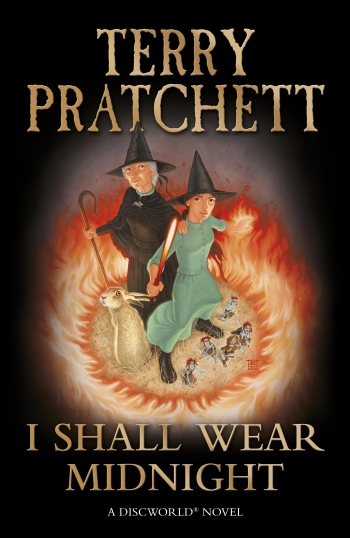Why you can trust 12DOVE
Tiffany’s back in another jewel
Witches have had a bad press down the years. Cackling, evil figures who capriciously turn people into amphibians just because they can, dunking and/or burning is too good for them. Yet the witch is also a figure who represents power wielded with wisdom, the wise woman with a healer’s eye for the fragility of life.
The tension between these two folk figures has been at the centre of Terry Pratchett’s depictions of witches in the Discworld almost from the start. Think of Esme “Granny” Weatherwax in Equal Rites , a witch so powerful that she has to keep a close watch on her own behaviour lest she go over to the dark side. And yet, while he’s hinted at it, Pratchett has never before explored what happens when ordinary people turn against witches, when a hysterical Salem moment is in the offing, when mob misrule takes over and every witch is an evil cackler rather than a wise-woman. How and why might this happen? To answer these questions, Pratchett turns once again to Tiffany Aching, the witch of the Chalk whom we first met as a nine-year-old in The Wee Free Men , in a novel that’s being marketed as for young readers.
Two books later ( A Hat Full Of Sky and Wintersmith ), Tiffany’s become an older-than-her-years teenager with, if not quite the weight of the world on her shoulders, at least the weight of the villages she serves. She’s a working witch, which is, in the Discworld, is akin to being a district nurse-cum-social worker, but with serious attitude .
But trouble is in the offing. An evil figure has awakened, a spiteful, jealous creature that preys on people’s minds and turns them against witches: the Cunning Man. He, or more accurately it , is a figure that Tiffany will have to face down alone. Oh, other witches might offer advice before the final showdown, but there are some battles a witch needs to fight by herself if she’s truly to command respect. As coming-of-age tasks go, this is a lot trickier than learning to stave off hunger by pouring hot water over Pot Noodle...
If this sounds rather solemn, then rest assured that around this central narrative, Pratchett’s trademark humour is as much in evidence as ever. In part, that means the usual outings for gags purloined from the music hall era. (A selfish, petty nurse tells Tiffany that she’s “never been so insulted before” in her life: “Really?” said Tiffany. “I’m genuinely surprised.”) In addition, the Nac Mac Feegles are on hand to provide slapstick moments involving fighting and drinking, and Pratchett doesn’t exactly skimp on such stock comic characters as the noble lady who’s not quite as posh as she pretends.
But that doesn’t mean the book lacks depth and resonance. A key central image that runs though the novel, for instance, is drawn from Pratchett’s own childhood, while the Chalk setting vividly brings to mind the southern England landscape where the writer has made his home. Most of all there’s the sense that Pratchett understands village life down to the core of his being – its rhythms, its joys and its considerable frustrations too.
If you wanted to be ultra-critical, you might say that Tiffany is in some senses a younger version of Granny, but it’s not an argument we’d make with any conviction. What lingers is yet again the sense of being in the company of a great comic writer and wit whose fantastical world illuminates our own because, when all’s said and done, they’re basically the same places.
Jonathan Wright
Ian Berriman has been working for SFX – the world's leading sci-fi, fantasy and horror magazine – since March 2002. He's also a regular writer for Electronic Sound. Other publications he's contributed to include Total Film, When Saturday Comes, Retro Pop, Horrorville, and What DVD. A life-long Doctor Who fan, he's also a supporter of Hull City, and live-tweets along to BBC Four's Top Of The Pops repeats from his @TOTPFacts account.

